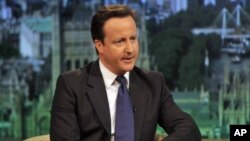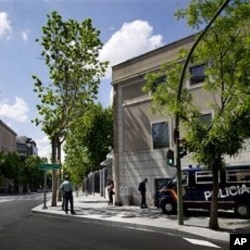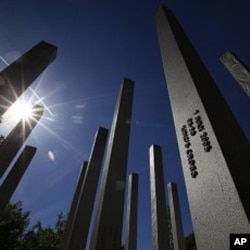European leaders from Russia to Britain have hailed the death of Osama bin Laden as a major achievement in efforts to rid the world of terrorism.
Swift reaction
Europe was swift to react to President Barack Obama's announcement that al-Qaida leader Osama bin Laden is dead.
In a statement Monday, the leaders of the European Council and European Commission said bin Laden's death made the world a safer place and showed that terrorist attacks do not remain unpunished.
Bin Laden's al-Qaida network led or inspired attacks around the world since 1993, killing at least 4,000 people.
British Prime Minister David Cameron congratulated U.S. President Barack Obama for the success of the Navy Seal operation that killed the terrorist leader in the Pakistan city of Abbottabad. He described the death of bin Laden as a massive step forward in the fight against extremist terrorism. "Of course, it does not mark the end of the threat we face from extremist terror. Indeed, we will have to be particularly vigilant in the weeks ahead," said Cameron. "But it is, I believe, a massive step forward."
Watch a related report by Henry Ridgwell
Message to terrorists
Russia, Germany, Italy and France also applauded U.S. forces for killing bin Laden. But many, like French Foreign Minister Alain Juppe, also offered a note of caution.
In remarks on French radio, Juppe said the world must be more vigilant than ever. He noted the bombing attack in the Moroccan city of Marrakesh just a few days ago that killed at least 14 people.
While bin Laden has been most spectacularly linked to the 2001 terrorist attacks in the United States, al-Qaida is also blamed for the 2004 train bombings in Spain that killed 191 people. The network also claimed credit for the 2005 bombings in London that killed 52 people.
Italian Prime Minister Silvio Berlusconi also welcomed the announcement, saying the world had been awaiting the news of bin Laden's death for 10 years -- since the September 11, 2001 attacks against the United States that left some 3,000 people dead in a matter of hours.
Germany's Chancellor Angela Merkel described it as a victory for the forces of peace in the world. But she echoed many European leaders' concerns by adding that bin Laden's killing by U.S. forces in Pakistan Sunday night did not mean that terrorist attacks would come to an end.
A statement released by the Kremlin in Russia, which is combating religious militants in the Caucasus, said that retribution inevitably reaches all terrorists and that Russia is ready to "step up" its coordination in the international fight against global terrorism.
Turkish President Abdullah Gul, who has been battling militant Kurdish separatists, said bin Laden's demise sent a message to terrorist organizations around the world.
Vigilance recommended
Disaffected youth in Europe have headed to terrorist training camps in Afghanistan and Chechnya, and al-Qaida's disparate branches have kidnapped Europeans overseas and warned Europe of more attacks to come.
"Although this is seen as a victory for many in the United States, it is one that is also shared by many here in Europe," said Maha Azzam, a Middle East analyst for the London-based think-tank Chatham House. "The specter of terrorism from al-Qaida has existed for a decade now in Europe and therefore the removal of this very important symbol is seen as an important step to undermining al Qaida."
French analyst Philippe Moreau Defarges believes bin Laden was a man of the past, who was unable to make a difference politically. He says that can be seen with the current Arab protests, in which al-Qaida appears largely marginalized.
"... but we still have a lot of frustrated people, we still have a lot of bitter people, and one way to be heard, one way to make some noise, is to use terrorism," he said.
For its part, France-based international police agency Interpol urged greater vigilance in dealing with a heightened terrorism risk as a result of bin-Laden's death.
Based in France, Interpol is the world’s largest international police organization, with 188 member countries.






